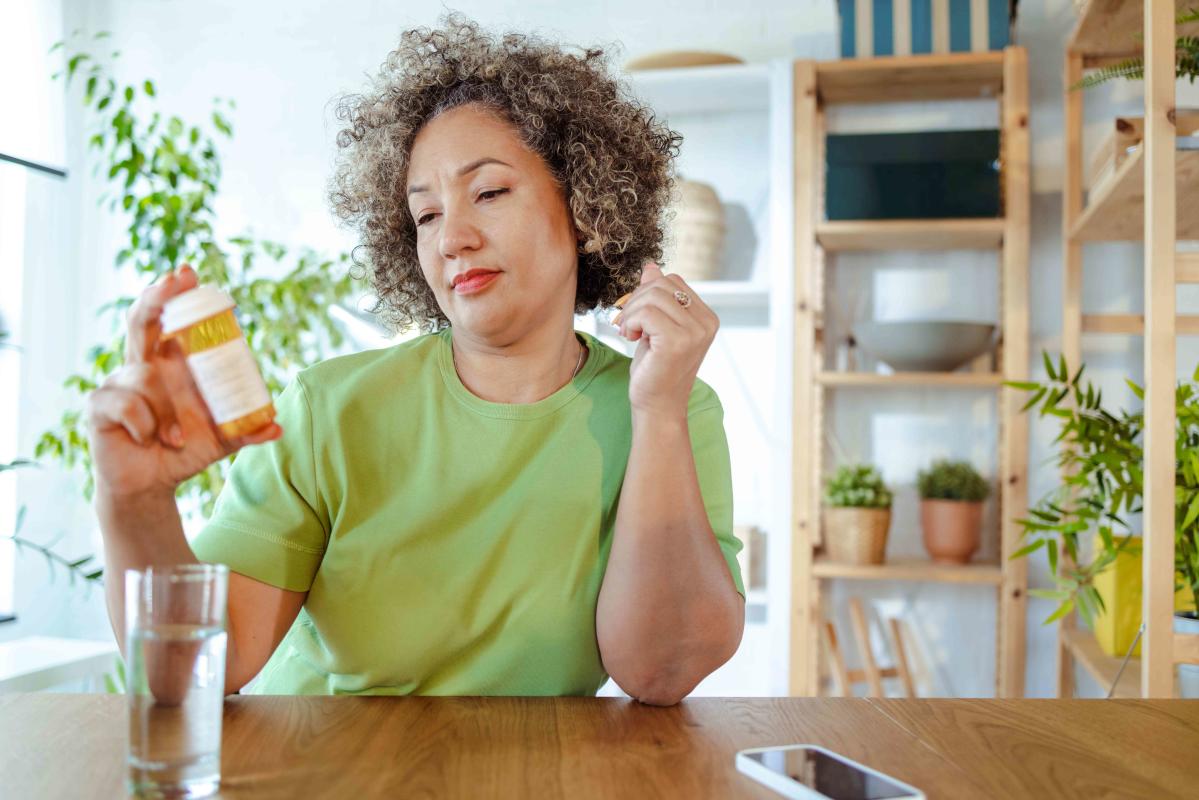
Vitamins and Supplements for Menopause
Medically reviewed by Renita White, MDMedically reviewed by Renita White, MD
Menopause is a natural occurrence defined as the decline in hormones, including estrogen, and the end of the menstrual cycle. It typically occurs between the ages of 45-52.
Vasomotor symptoms (temperature-related), such as hot flashes and night sweats, are the most common symptoms reported during menopause. Other menopause symptoms include difficulty sleeping, vaginal dryness, sexual dysfunction, weight gain, and mood disorders like depression or anxiety.
Hormone replacement therapy (HRT) is the primary treatment prescribed to relieve these symptoms. However, due to its possible risks, many people prefer or need to use alternative medicine or supplements.
Black cohosh, dong quai, and red clover are some supplements that might be helpful during menopause, but data on their effectiveness is lacking. They are not meant to replace prescribed treatments like HRT. Always discuss possible benefits and risks with your healthcare provider before trying new supplements for menopause symptoms.
Black Cohosh
Black cohosh is a plant found in North America. Native Americans traditionally used it to treat symptoms like musculoskeletal pain, fever, and cough. Today, black cohosh is commonly used to treat menopausal symptoms. Researchers are unsure about how exactly black cohosh works in this regard. For example, it might increase estrogen and other hormone levels or affect brain-related activity linked to inflammation and pain reception.
Studies have had mixed results on the effectiveness of black cohosh on menopausal symptoms. Some studies have found that black cohosh doses of 40-127 milligrams (mg) daily for up to 12 weeks reduced hot flash frequency and menopause symptoms, functioning similarly to low-dose estradiol (a supplemental hormone).
One review evaluated women receiving a 6.5-160 mg daily dose of black cohosh and found no significant reduction of vasomotor symptoms or overall symptom relief. Overall, data is conflicting on whether black cohosh is useful in reducing menopause symptoms.
Here are some considerations:
-
Recommended doses for black cohosh range from 40-128 mg daily for up to 12 months. Supplements are commonly sold in powder, liquid, or pill form.
-
The most commonly reported side effects of black cohosh include stomach upset, skin rash, headache, and breast tenderness.
-
Black cohosh is not recommended in people with a history of liver damage or disease or people who are pregnant.
-
There have been no relevant drug interactions reported with black cohosh.
Flaxseed
Flaxseed is an edible seed containing high omega-3 fatty acids, alpha-linolenic acid (ALA), and fiber. It has shown promising benefits in various areas of health, including weight loss, cancer, inflammation, and heart and blood vessel health. Flaxseeds contain phytoestrogens, which are similar to estrogen.
The data on the benefits of flaxseed for menopause symptoms is inconsistent. Some researchers have found that flaxseed may lower the severity and frequency of hot flashes as well as night sweats. One study found that people taking flaxseed for three months experienced fewer menopause symptoms and improved quality of life. However, other studies have found that flaxseed does not play a significant role in helping these symptoms.
Here are some considerations:
-
Flaxseed is considered safe in doses of up to 30-60 grams daily for up to 12 months. It’s available as a seed or as an oil.
-
You can add flaxseed to foods and consume it as part of your diet.
-
Few side effects have been reported. The most frequently reported include diarrhea, bloating, and flatulence, likely due to flaxseed’s high fiber content.
Calcium and Vitamin D
Bone loss and the risk of osteoporosis increase during menopause due to decreased estrogen levels in the body. Calcium and vitamin D are key to managing osteoporosis and overall bone health. Both help increase bone mineral density (the strength of your bones) and decrease fracture risk.
The Tolerable Upper Intake Level (UL) for supplemental calcium (the maximum daily intake of a nutrient unlikely to cause harm) is 2,500 mg daily for adults aged 19-50 and 2,000 mg daily for adults over the age of 51. The general recommendation after menopause is 1,200 mg daily.
The daily recommendation for vitamin D after menopause ranges from 15-20 micrograms (mcg), or 600-800 international units (IU).
Here are some other considerations:
-
Most data shows that calcium and vitamin D must be taken together (or with other bone health vitamins and minerals) to be the most effective.
-
There are risks associated with excessive intake of both supplements.
-
Calcium can reduce the absorption of certain drugs, including thyroid medications and some antibiotics. You might also need to take it separately from medications used to treat osteoporosis.
-
Vitamin D may interact with medications like statins (used to lower cholesterol), corticosteroids (e.g., prednisone), and thiazide diuretics (used to treat conditions like hypertension and edema, or swelling).
Dong Quai
Dong quai is a plant in the same family as carrots, celery, and parsley. It’s popular in Chinese medicine and is often used for female reproductive health, including menopausal symptoms. The plant is believed to act similarly to the hormone estrogen.
Despite its similarities to estrogen, many researchers have found that dong quai does not significantly affect vasomotor symptoms. One group of studies concluded that taking dong quai was no better than taking a placebo (a product with no active properties, like a sugar pill) in reducing menopausal symptoms, including vasomotor symptoms. It also did not affect vaginal cells or endometrial tissue.
However, numerous smaller studies have found that dong quai decreased the frequency and intensity of hot flashes and night sweats.
Here are some considerations:
-
Dong quai is considered safe in doses up to 150 mg daily.
-
Side effects reported with dong quai include sensitivity to sunlight, hypertension (high blood pressure), and flatulence (gas).
-
Potential drug interactions with dong quai include medications that affect blood clotting (such as warfarin) and estrogen.
Red Clover
Red clover is a plant in the legume family. It contains isoflavones, which are compounds similar to estrogen. Red clover and isoflavones may help relieve symptoms associated with lower levels of estrogen in people with menopause. For this reason, red clover supplements are thought to be beneficial in treating menopausal symptoms.
One group of researchers found that red clover may decrease the intensity and frequency of hot flashes in people experiencing menopause symptoms. The doses in these studies ranged from 40-80 mg per day. Similar to other supplements, the research results on red clover for menopausal symptom treatment have been inconsistent.
Here are some considerations:
-
Red clover doses up to 80 mg daily for up to two years are considered safe.
-
Adverse events reported with red clover use include headache, nausea, and muscle aches.
-
Potential drug interactions with red clover include medications that affect blood clotting (such as warfarin).
-
Red clover is not recommended for people who are pregnant or breastfeeding.
Other Supplements for Menopause
Other supplements, vitamins, and minerals might be beneficial during menopause. Examples include the following:
-
Evening primrose: Products containing the plant evening primrose may reduce the frequency and severity of hot flashes during menopause. However, some research has found minimal benefits. Overall, there does not appear to be enough evidence to support the use of evening primrose for menopause symptoms.
-
Soy products: Soy products—through diet or supplements—have been shown to ease hot flashes and help improve overall bone mineral density. However, many studies were small, and more data is needed to confirm soy’s role in relieving menopause symptoms.
-
St. John’s wort: St. John’s wort may reduce menopausal symptoms, including hot flashes and overall quality of life. Studies have found this is especially true when it’s taken with other supplements, like black cohosh. However, St. John’s wort is known to interact with many medications and conditions, especially those related to mental health.
-
Vitamin E: Vitamin E may be helpful to those experiencing vasomotor symptoms and metabolic changes caused by menopause. In one study, participants who took 800 international units (IU) of vitamin E reported a decrease of one hot flash per day. More studies are needed to determine Vitamin E’s role in menopause symptom relief.
Considerations and Precautions
Data on herbal supplements for treating menopause symptoms is conflicting. Many organizations, such as the American College of Obstetrics and Gynecologists (ACOG) and the North American Menopause Society, advise against recommending herbal supplements, as they are unlikely to be beneficial. Always discuss with your healthcare provider whether adding a supplement to your daily routine would be safe for you.
When shopping for supplements, make sure you buy safe and high-quality products. Unlike prescription and over-the-counter (OTC) medications, the U.S. Food and Drug Administration (FDA) does not regulate supplements. Therefore, shopping for supplements tested by independent third-party organizations helps ensure product quality (for example, the ingredients listed are actually the ingredients in the supplement).
Popular organizations that offer quality testing include United States Pharmacopeia (USP), NSF International, and ConsumerLab.com. You can look for their labels on the product packaging.
A Quick Review
Menopause is defined as the decline in hormones, like estrogen, and the end of the menstrual cycle. It typically occurs from 45-52 years of age. People going through menopause often experience symptoms such as hot flashes, night sweats, and vaginal dryness.
Hormone replacement therapy (HRT) is the primary treatment prescribed to relieve menopausal symptoms. However, due to the risks associated with HRT, many people prefer or need to use alternative medicine or supplements. Overall, data is conflicting on how useful supplements like black cohosh, flaxseed, and dong quai are for menopause symptoms. That said,
Supplements are not a replacement for prescribed treatments in the treatment of menopause symptoms. Always discuss possible benefits and risks with your healthcare provider before adding any supplements for menopause symptoms to your daily routine.
For more Health.com news, make sure to sign up for our newsletter!
Read the original article on Health.com.

